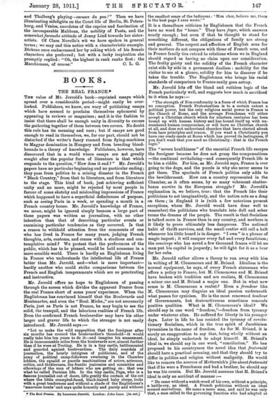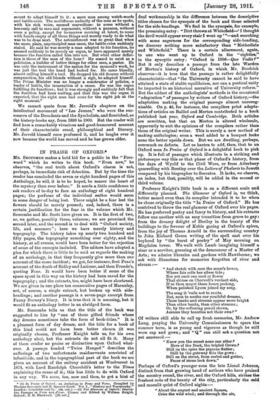BOOKS.
THE REAL FRANCE.* THE value of Mr. Jerrold's book—reprinted essays which spread over a considerable period—might easily be over- looked. Publishers, we know, are wary of publishing essays which have seemed to proclaim themselves ephemeral by appearing in reviews or magazines ; and it is the fashion to insist that there shall be enough unity in diversity to excuse the gathering together of them between two covers. No doubt this rule has its meaning and uses ; but if essays are good enough to read in themselves, we, for our part, should not be disturbed if the writer's fancy roamed from flying-machines
to Magyar domination in Hungary and from breeding blood- hounds to a theory of knowledge. Publishers, however, have discovered that in a world where essays are not greatly
sought after the popular form of literature is that which responds to the question, "How does it end ? " Mr. Jerrold's papers have no particular beginning and no particular ending; they pass from politics to a mining disaster in the French "Black Country," from that to literature, and from literature to the stage. This kind of book, just achieving sufficient unity and no more, might be rejected by most people in favour of some sketchy and misleading impressions of France which happened to have a superficial definiteness of purpose, such as seeing Paris in a week, or spending a month in a French country house. Mr. Jerrold's knowledge of France, we mean, might be ignored simply because a large part of these papers was written as journalism, with no other intention than that of describing particular events or examining particular tendencies as they occurred. Is that a reason to withhold attention from the comments of one who has lived in France for many years, judging French thoughts, arts, customs, and crazes with a studious and con- templative mind ? We protest that the preferences of the public, which has to be pleased, would be held nonsense in a more sensible world. There is hardly an Englishman living
in France who understands the intellectual life of France better than Mr. Jerrold, and—what is more important—
hardly another who could strike comparisons between the French and English temperaments which are so penetrating and instructive.
Mr. Jerrold offers no hope to Englishmen of passing through the screen which divides the apparent France from the real France short of some years' experience. When the Englishman has convinced himself that the Boulevards and Montmartre, and even the "Boul. Miche.," are not necessarily Paris, just as Paris is not France, he may begin to see the solid, the tranquil, and the laborious realities of French life.
Even the confirmed French boulevardier may have his other larger and graver life to which the stranger is not easily introduced. Mr. Jerrold says :-
"Lot us make the wild supposition that the foreigner after six months has crossed the boulevardier's threshold—it would really take him ten years to do it—and imagine his amazement. He is immeasurable miles from the boulevards now, almost further than if ho were at Tooting. He is in a tiny castle, battlemented and guarded against boulevardism. The daily scandals of journalism, the hourly intrigues of politicians, and of the army of political camp-followers swarming in the Chamber lobbies, the squalid or puerile machinations of actors, actresses, critics, and theitreuses, the frantic jealousies and scrambles and elbowings of the men of letters who are getting on : that was what he called Parisian life. In the tiny castle, Papa, who is a famous journalist out of doors, lifts gently the curtain of the cot where the little crumpled-faced, black-haired baby sleeps, looks with a great tenderness and without a shade of the Englishman's ‘mauvaise honte' and says quite honestly and purely and without • TJi. Beat Franc.. By Laurence Jerrold. London: John Lane. Da. net.] the smallest sense of the ludicrous : Mon cher, believe me, there is the best page I ever wrote.'" It is a threadbare criticism by Englishmen that the French have no word for "home." They have foyer, which answers
nearly enough ; but even if that be thought to stand for something different, the obligations of family are strong and general. The respect and affection of English sons for their mothers do not compare with those of French sons, and in France family ties extend to relations whom we in England should regard as having no claim upon our consideration.
The frothy gaiety and the solidity of the French character exist side by side in a permanent dualism : mobility for the visitor to see at a glance, solidity for him to discover if he takes the trouble. The Englishman who brings his racial standards of comparison to France easily goes astray.
Mr. Jerrold hits off the bland and ruthless logic of the French particularly well, and suggests how much is sacrificed to it when he says:—
"The strength of Non-conformity is a force of which France has no conception. French Protestantism is to a certain extent a political power, but the only religious social power in France is the Church of Rome, and the average Frenchman will either accept a Christian church which for nineteen centuries has been bound up with human history and has bound itself up with un- numbered human compromises, or will have no Christian church at all, and does not understand churches that have started afresh from bare principles and reason. If you want a Christianity you have one ready-made at Rome which has proved its lastingness, if you don't want that you need no Christians.... that is the French logic."
The "severe healthiness" of the essential French life escapes the foreigner because he does not grasp the compensations —the continual revitalising—and consequently French life is to him a riddle. For him, as Mr. Jerrold says, France is ever going to the dogs, and the puzzle is why she never seems to get there. The spectacle of French politics only adds to
the bewilderment. How can a country represented in the Chamber, as it often seems, by so many vehement chatter-
boxes survive in the European struggle ? Mr. Jerrold's explanation is, we believe, true : that the French like their politicians to act imaginatively, and the nation acts as a drag on them ; in England it is (with a few notorious present exceptions, whom Mr. Jerrold would have done well to remember) the politicians who translate into dull and sober terms the dreams of the people. The result is that Socialism is talked more in France than in any country, and nowhere is it likely to prove ultimately leas dangerous. The national habit of thrift survives, and the small rentier will call a halt whenever his little hoard is in danger. "I own" is a phrase of magic import ; it will conquer every fad and every fanaticism; the concierge who has saved a few thousand francs will let no man put his capital in jeopardy; he will fight for it as a bear for her cubs.
Mr. Jerrold rather allows a theory to run away with him in writing of M. Clemenceau and M. Briand. Idealism is the normal equipment, he says, of every French statesman who offers a policy to France, but M. Clemenceau and M. Briand have broken with tradition and are realists, M. Clemenceau a minor one and M. Briand a major one. But in what new sense is M. Clemenceau a realist ? Even a frondeur like
M. Clemenceau may disguise an ideal passion underneath what passes for cynicism. He is the most renowned tombeur
of Governments, but destructiveness sometimes conceals positive qualities. What is M. Clemenceau's ideal P We
should say in one word "freedom,"—freedom from tyranny under whatever alias. He suffered for liberty in his younger
days. Later in life he has resisted the tyranny of revolu- tionary Socialism, which in the true spirit of Jacobiniarn tyrannises in the name of freedom. As for M. Briand, it is surely an exaggeration to say that, being wholly without an ideal, he simply undertook to adapt himself. M. Briand's
ideal is, we should say in one word, "conciliation." He has proposed to his countrymen the novel idea that fraternal should have a practical meaning, and that they should try to differ in politics and religion without malignity. He would like to remove the sources of Metternich's jibe about fraternal that if he were a Frenchman and had a brother, he should say he was his cousin. But Mr. Jerrold assumes that M. Briand's ideal is only an accident of manner :—
" He came without& watch-word of his own, without a principle, a battle-cry, an ideal. A French politician without an ideal seemed marvellous. He came a mere man, and said he was only that, a man called to the governing function who had adapted or meant to adapt himself to it : a mere man among watch-words and battle-cries. The mellifluous audacity of the man as he spoke, with his rich voice, seemed marvellous: to come without a heavenly call to save and regenerate, without a panacea, without even a policy, except for to-morrow morning at latest, to come with hands empty of all these things and merely ready to do what was to be done next. The astonishment was so great that when the mere, plain, unprincipled man came, the battle-cries suddenly staled. Ile said he was merely a man adapted to his function, he seemed suddenly to be merely an organ, to have appeared merely because the function called him into use. But what other defini- tion is there of the man of the hour? He ceased to exist as a politician, a builder of better things for other men, a pastor. He was only the instrument of the nation for the moment's work, he was just the tool the hand had looked for. He came blandly, almost calling himself a tool. He dropped his old dreams without compunction, his old friends without a sigh, he adapted himself. The Prime Minister was no longer a constructor of policies, a leader of battle, the incarnation of a cause. He was the organ fulfilling its functions; but it was strongly and suddenly felt that the function had been waiting, and that this was the organ it expected, that the right man had come for the right job at the right moment."
We cannot quote from Mr. Jerrold's chapters on the intellectual movement of "Lea Jennes," who were the suc- cessors of the Decadents and the Symbolists, and flourished, as the history-books say, from 1890 to 1900. But the reader will find here a remarkably vivacious and good-humoured account of their characteristic creed, philosophical and literary. Mr. Jerrold himself once professed it, and he laughs over it now because the world has moved and he has grown older.























































 Previous page
Previous page